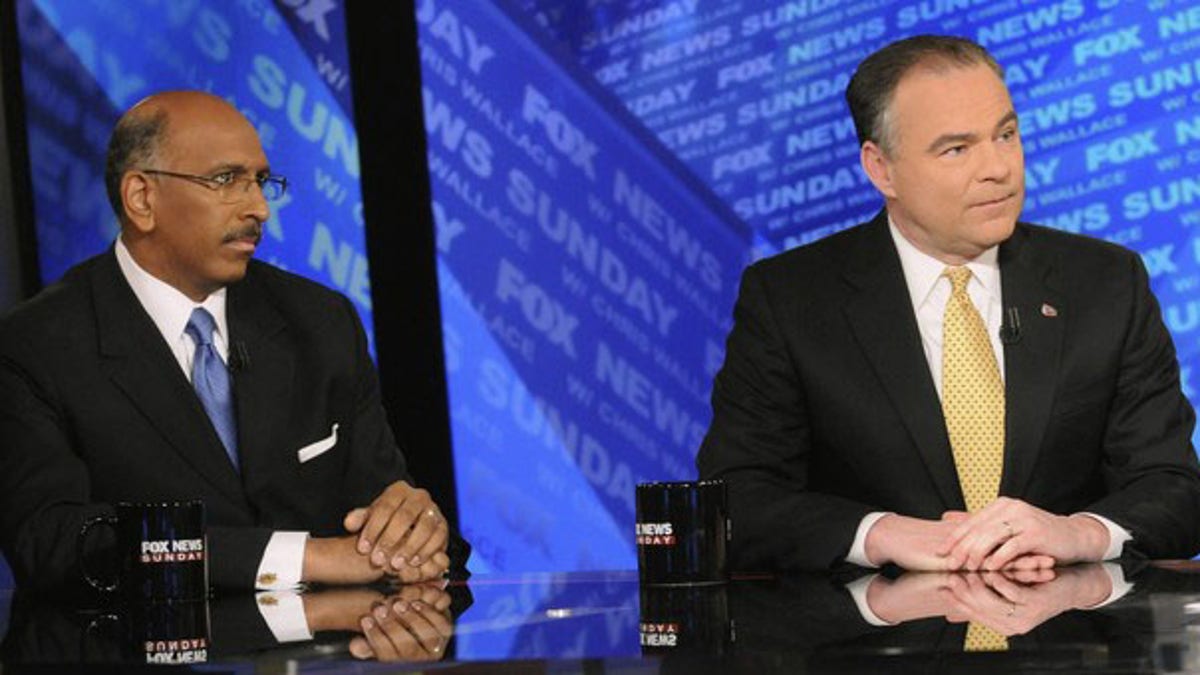
Republican National Committee Chairman Michael Steele, left, and Democratic National Committee Chairman Tim Kaine appear on 'Fox News Sunday' in Washington Jan. 10. (Reuters Photo)
The dust settles. The smoke clears. And from the bottom of the pileup, Scott Brown emerges with ball in hand.
Brown's stunning upset victory in Tuesday's Massachusetts Senate election changed more than the "political math" on Capitol Hill, as Senate Majority Leader Harry Reid acknowledged. The Republican candidate's capture of the Senate seat the late Ted Kennedy held for nearly five decades also changed the calculus for both parties as they look ahead to the November midterm elections.
Republicans and Democrats alike were drawing lessons from Brown's win even before it happened, with one side looking to replicate his success, and the other hoping to neutralize his potential imitators.
In the two days since Brown's victory, Republicans have rejoiced, citing his win as evidence that President Obama's ambitious government-centered agenda has failed. Democrats, meanwhile, have cowered, and are rethinking their approach to health care reform at levels all the way up to the White House.
Brown's victory is expected to reward the Republican Party with a windfall of fundraising and eager recruits. So far, the national party infrastructure is claiming a good measure of responsibility for his win, with the Republican National Committee touting its get-out-the-vote operation in the Bay State.
But Kevin Madden, former spokesman for Mitt Romney's presidential campaign, suggested the RNC -- and its controversial chairman, Michael Steele -- may want to learn some lessons as well.
"The people who deserve credit are, first, Scott Brown, and secondly the people on his campaign," Madden said. "It became a national election in the space of one week."
"I don't think Brown was following any of the 12 rules in Steele's new book," said Jeremy Mayer, public policy professor at George Mason University.
Mayer said both major parties need to be careful in how they read the race. He said Republicans cannot take it as a sign that they should oppose absolutely everything with a Democrat's name on it. And Democrats, he said, should not become "Reagan Democrats" in response.
"The Democrats are really in trouble if they panic," he said.
The immediate take-home point from Brown's win seems to be that economy- and jobs-based campaigns are successful, and strategists expect both parties to process that lesson quickly in the races ahead.
"The message of economic pragmatism trumps all right now when it comes to persuading voters," Madden said.
Soon after Brown's win, Democratic Senatorial Campaign Committee Chairman Robert Menendez said Democrats "need to redouble our efforts on the economy." Other Democrats cited economic concerns foremost in their reaction to the Massachusetts results.
But the other lessons the parties draw will determine how effective their playbooks are in November.
Mayer said Democrats would be wise to "go populist" and focus on targeting Wall Street on one end -- something Obama did with his proposal to limit risk-taking on Thursday -- and targeting insurance companies on the other.
He said Democrats can craft a successful health care bill by homing in on the specific reforms that stop insurance companies from denying and cutting off coverage, and leaving out other proposals. From there, he said, Democrats can tout those achievements on the campaign trail.
But he said Republicans can "trump" that card by doing the same thing. He said the party would achieve a bigger win by working with Democrats and then taking "ownership" of a pared-down health bill. He said Republicans will lose their momentum if they take Brown's win as a sign that they should be the "Party of No."
But it's unclear which path GOP leaders want to take.
"This bill is dead," House Minority Leader John Boehner said Thursday, declaring that his members would not work with the other side of the aisle on a bill he called a "monstrosity." But he suggested Republicans still want to work on health care in a "bipartisan way."
Analysts said that as Democrats look at the vulnerable field before them, they likely will try hard not to repeat the obvious mistake Martha Coakley's Massachusetts campaign, and be aggressive and pro-active early on against their GOP opponents, no matter how blue the district.
Republicans should be prepared for that. But likewise, Democrats should be prepared for a tough message from the GOP on the Obama administration's agenda.
GOPAC Chairman Frank Donatelli said the lesson from last November's gubernatorial races in Virginia and New Jersey and this week's Senate race in Massachusetts is that "there is no penalty to be paid for opposing the Obama agenda."
But he agreed with the assertion that Republicans can't just be anti-Obama all the time. The GOP needs to stand for something, he said.
Madden said Republicans can win if they keep the middle, by focusing on jobs and overspending.
"What this election tells us is Democrats have driven away independents from their party and into our hands," he said. "How we keep them is up to us."
























